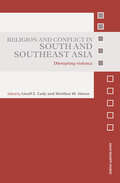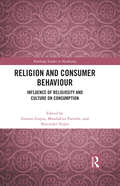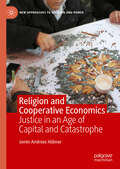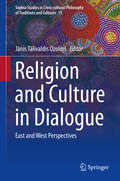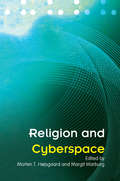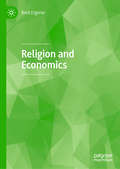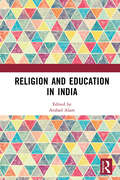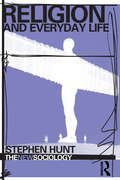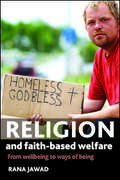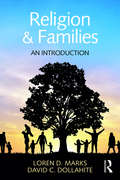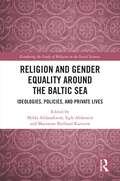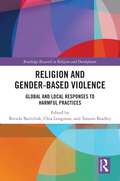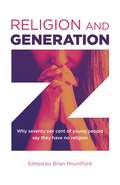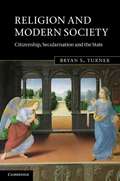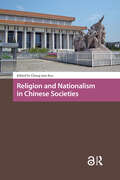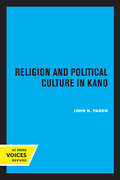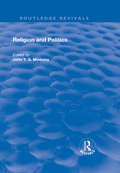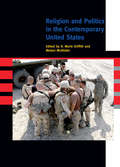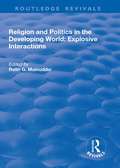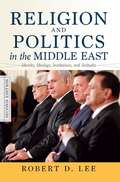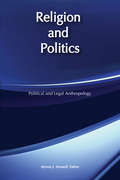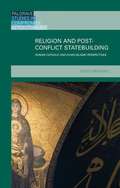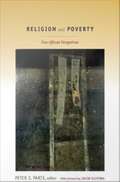- Table View
- List View
Religion and Conflict in South and Southeast Asia: Disrupting Violence (Asian Security Studies)
by Linell E. Cady Sheldon W. SimonA major new contribution to comparative and multidisciplinary scholarship on the alignment of religion and violence in the contemporary world, with a special focus on South and Southeast Asia. Religion and Conflict in South and Southeast Asia shows how this region is the site of recent and emerging democracies, a high degree of religious pluralism, the largest Muslim populations in the world, and several well-organized terrorist groups, making understanding of the dynamics of religious conflict and violence particularly urgent. By bringing scholars from religious studies, political science, sociology, anthropology and international relations into conversation with each other, this volume brings much needed attention to the role of religion in fostering violence in the region and addresses strategies for its containment or resolution. The dearth of other literature on the intersection of religion, politics and violence in contemporary South and Southeast Asia makes the timing of this book particularly relevant. This book will of great interest to advanced undergraduate and postgraduate students of Asian politics, security studies and conflict studies.
Religion and Consumer Behaviour: Influence of Religiosity and Culture on Consumption (Routledge Studies in Marketing)
by Gaurav Gupta Shivinder Nijjer Mandakini ParuthiReligion is an important part of individual lives, playing a major role in our decision making and puchasing. Understanding the influence of religion on consumer behaviour is therefore an essential practice for business. The COVID-19 pandemic has especially enhanced the influence of consumers’ religiosity on their consumption decisions. This book concentrates on understanding the relationship of religiosity with various aspects of consumption and consumer behaviour to improve policy and build on an under represented topic. In this edited collection, expert contributors, academicians and researchers discuss the influence of religion on consumer behaviour in depth including the “dark side” of religion on consumers’ consumption behaviour and religious cults. The chapters also explore the ethical issues surrounding consumption and the role of religion on branding and sustainable practices. With a broad perspective, the book draws on examples of practices from Christianity, Islam, Hinduism and Buddhism. This book will be a particularly valuable resource for scholars and upper level students of marketing, consumer behaviour and consumer psychology. The interdisciplinary perspectives will also appeal to those studying sociology and globalization.
Religion and Cooperative Economics: Justice in An Age Of Capital And Catastrophe (New Approaches to Religion and Power)
by Jamin Andreas HübnerThis volume looks at the intersection between religion and cooperative economics through the lens of economic justice. It covers world religious traditions and gives particular focus to cooperative organization, the social and economic problems of capitalism, and the earliest Christian tradition of the Jesus movement. It also examines religious and theological discourse in contemporary defenses of neoliberal capitalism and contemporary advocates of cooperatives. The book serves to unfold both how and why cooperative economics can and should supplant traditional employer-employee relationships (a pillar of modern capitalism) and revive interest in cooperation, worker solidarity, and significant social and political reforms.
Religion and Culture in Dialogue
by Jānis Tālivaldis OzoliņšThis volume addresses the issue of the human encounter with the Mystery of God and the purpose of human life. It explores major themes from diverse cultural and philosophical traditions, starting with questions about the possibility of belief in God, His transcendence as seen in both East and West, and ending with questions about ethics and about personhood, human dignity and human rights. Taking an eclectic approach, the chapters in this book each uniquely address aspects of the human encounter with the Mystery of God, drawing from specific cultures and traditions, and using a particular philosophical and theological style. Together, the chapters provide a fresh approach and a synergy that ensures that each topic contributes something new to the dialogue between religion and culture.
Religion and Cyberspace
by Margit Warburg Morten T. HøjsgaardIn the twenty-first century, religious life is increasingly moving from churches, mosques and temples onto the Internet. Today, anyone can go online and seek a new form of religious expression without ever encountering a physical place of worship, or an ordained teacher or priest. The digital age offers virtual worship, cyber-prayers and talk-boards for all of the major world faiths, as well as for pagan organisations and new religious movements. It also abounds with misinformation, religious bigotry and information terrorism. Scholars of religion need to understand the emerging forum that the web offers to religion, and the kinds of religious and social interaction that it enables.Religion and Cyberspace explores how religious individuals and groups are responding to the opportunities and challenges that cyberspace brings. It asks how religious experience is generated and enacted online, and how faith is shaped by factors such as limitless choice, lack of religious authority, and the conflict between recognised and non-recognised forms of worship. Combining case studies with the latest theory, its twelve chapters examine topics including the history of online worship, virtuality versus reality in cyberspace, religious conflict in digital contexts, and the construction of religious identity online. Focusing on key themes in this groundbreaking area, it is an ideal introduction to the fascinating questions that religion on the Internet presents.
Religion and Economics
by Resit ErgenerThis book allows the reader to have an overview of the relations between religion and economics throughout history. It starts with the beginnings of early modern humans, when dreams (of dead ancestors), animism, synchronous movements and a propensity to exchange, led to the emergence of religion, which then contributed to the coordination and pooling of labor and to the definition of groups. This book surveys the various roles played by religion in economic life through the ages, which include the justification of the exploitation of nature, the expansion of trade, the emergence of inequality and of charity, the definition, enhancement and attenuation of hierarchies of dominance, the provision of various services and of the impact religion has had on economic performance at the micro and macro levels.
Religion and Education in India
by Arshad AlamThis book studies the relationship between religion and education in the Indian context. It analyses the creative interface between religion and education as empirical categories and overlapping modes of pedagogical transmission. The volume investigates the ways in which religious identities are shaped through education both at home and at school. It brings together academics and researchers working in different faith traditions like Islam, Hinduism, and Sikhism to understand the significance of transmitting religious education and the need to pay closer attention to sites through which religious instruction is being disseminated. Topical and lucid, this book will be an important reading for scholars and researchers of sociology, religious studies, secularism, sociology of education, political sociology, South Asia studies, and education in general.
Religion and Ethnicity in Canada
by Paul Bramadat David SeljakAs the leading book in its field, Religion and Ethnicity in Canada has been embraced by scholars, teachers, students, and policy makers as a breakthrough study of Canadian religio-ethnic diversity and its impact on multiculturalism. A team of established scholars looks at the relationships between religious and ethnic identity in Canada's six largest minority religious communities: Hindus, Buddhists, Sikhs, Jews, Muslims and practitioners of Chinese religion. The chapters also highlight the ethnic diversity extant within these traditions in order to offer a more nuanced appreciation of the variety of lived experiences of members of these communities.Together, the contributors develop consistent themes throughout the volume, among them the changing nature of religious practice and ideas, current demographics, racism, and the role of women. Chapters related to the public policy issues of healthcare, education and multiculturalism show how new ethnic and religious diversity are challenging and changing Canadian institutions and society. Comprehensive and insightful, Religion and Ethnicity in Canada makes a unique contribution to the study of world religions in Canada.
Religion and Everyday Life (The New Sociology)
by Stephen HuntThis introductory text explores the historical and contemporary relevance of religion to social life, through an examination of practice and belief. Author Hunt reconsiders how theories and concepts are lived at the level of selfhood and cultural identity, through religious and spiritual belief. At the same time he looks at contemporary changes in religious life and how these are impacted by socialization, institutional belonging, and belief, and at the significance of class, gender, age and ethnicity. Individual chapters cover a range of issues, such as: religion, identity and community secularization and pluralism traditional Christianity: change and continuity globalization and the global context religion and ethnicity. The text challenges much current sociological thought and deals with contemporary Christianity, a range of world faiths and new and developing expressions of religion and spirituality. With tables and diagrams to illustrate key points and trends, it provides an accessible and captivating introduction to the sociology of religion.
Religion and Faith-Based Welfare: From Wellbeing to Ways of Being
by Rana JawadThis original book makes a timely and potentially controversial contribution both to the teaching of social policy and the wider debates surrounding it in Britain today. It offers a critical and theoretically sensitive overview of the role of religious values, actors and institutions in the development of state and non-state social welfare provision in Britain, combining historical discussion of the relationship between religion and social policy in Britain with a comparative theoretical discussion that covers continental Europe and North America. Grounded in new empirical research on religious welfare organisations from the nine major faiths in the UK, the book brings together all of these perspectives to argue for an analytical shift in the definition of wellbeing through a new concept called 'ways of being'. This reflects the moral, ideational and cultural underpinnings of social welfare. Written in a readable style, the book will appeal to students and tutors of social policy, as well as policy-makers seeking to inform themselves about the key issues surrounding faith-based welfare in modern Britain.
Religion and Families: An Introduction (Textbooks in Family Studies)
by Loren D. Marks David C. DollahiteThis is the first multidisciplinary text to address the growing scholarly connection between religion and family life. The latest literature from family studies, psychology, sociology, and religion is reviewed along with narratives drawn from interviews with 200 racially, religiously, and regionally diverse families which bring the concepts to life. Written in a thought-provoking, accessible, and sometimes humorous style by two of the leading researchers in the field, the book reflects the authors’ firsthand experience in teaching today’s students about religion’s impact on families. Prior to writing the book, the authors read the sacred texts of many faiths, interviewed religious leaders, and attended religious services for a wide array of faiths. The result is an accurate and engaging account of why and how families are impacted by their religion. The pedagogical features of the text include boldfaced key terms defined in the glossary, text boxes, chapter conclusions, summary points, and review questions. Religion and Families: Examines several denominations within Christianity, Judaism, and Islam. Reviews findings from racially and ethnically diverse families, from traditional and diverse family forms, and examines gender and life-course issues. Addresses the impact of one’s religious involvement on longevity, divorce rates, and parenting styles. Considers demographic, family-, couple-, and individual-level data that relate to prayer and other sacred practices. Presents a balanced treatment of the latest research and a new model for studying family and religion. Explores the "whys," "hows," and processes at work in the religion-family connection. The book opens with a discussion of why religion and family connections matter. Chapter 2 defines religion and presents a new conceptualization of religion. Empirical research connections between religion and marriage, divorce, family, and parent-child relationships are explored in chapters 3 through 6. The interface between religion and the family in Christianity, Judaism, and Islam are reviewed in chapters 7, 8, and 9. Chapter 10 explores the unique challenges that religion presents for diverse family forms. Prayer as a coping mechanism for life’s challenges such as death and disability are explored in chapter 11. Chapter 12 examines forgiveness in the context of marriages and families. The book concludes with a review of the book’s most important themes and findings. Intended as a text for undergraduate courses in family and religion, the psychology or sociology of the family, the psychology or sociology of religion, pastoral/biblical counseling, or family and youth ministry, taught in human development and family studies, psychology, sociology, religion, social work, pastoral counseling, and sometimes philosophy. This book also appeals to family therapists and counselors.
Religion and Gender Equality around the Baltic Sea: Ideologies, Policies, and Private Lives (Gendering the Study of Religion in the Social Sciences)
by Marianne Bjelland Kartzow Milda Ališauskienė Eglė AleknaitėThis volume aims to rethink the intersections of gender and religion, as well as the secular and religious, in implementing and challenging gender equality at individual, institutional, and societal levels in the regions around the Baltic Sea. Acknowledging the diversity of societies and the significance of socio-historical contexts, the empirical data discussed in this book draw attention to the under-researched region of post-socialist Baltic states. The analyses presented in the chapters are based on fieldwork carried out in Lithuania, Latvia, Estonia, and Norway. This volume includes sociological, anthropological, historical, political science, and theological perspectives and covers five broad research areas: a shifting concept of gender equality and its developments in Baltic and Nordic countries; a diversity of developments within religious groups related to issues of gender equality and the negotiation of competing gender ideologies; inter-religious developments and gender equality; the role of religions in the construction of public discourse on gender equality; and religious socialization, focusing on the promotion of religious gender models through socialization and public education.
Religion and Gender-Based Violence: Global and Local Responses to Harmful Practices (Routledge Research in Religion and Development)
by Tamsin Bradley Chia Longman Brenda BartelinkThis book takes religion as an entry point for a deeper exploration into why practices of gender-based violence continue and what possible actions might help to contribute to their eradication. International donors are committed to reducing and ending gender-related harm, particularly violence against women, but clear answers as to why harmful practices persist are often slow to emerge. Theological research struggles to find strong links, yet religion is often referred to by local people as the reason for practices such as female cutting, male circumcision, early and forced marriage, nutritional taboos and birth practices, mandatory (un)veiling, harmful spiritual practices, polygamy, gender unequal marital and inheritance rights and so-called honour crimes. This book presents empirical cases of religious, non-religious and secular actors, including local and international governmental and non-governmental agencies in the fields of development, health and equality policies. Tracing their different understandings of how religion is entangled with gender-based violence both contextually as well as historically, the book sheds light on helpful and unhelpful as well as erroneous and harmful understandings of such practices in local and global perspectives. Centralising the perspectives of women themselves, this book will be an important read for development practitioners and policy makers, as well as for researchers across religious studies, gender studies, and global development.
Religion and Generation Z: Why Seventy Per Cent of Young People Say They Have No Religion
by Brian MountfordIn 2017 NatCen&’s British Social Attitudes survey published statistics that 53% of the people in Britain say they have &‘no religion&’ and that of those 70% of the 18-24 age-group claim to have 'no religion'. These essays attempt to say why, and are individual responses rather than a systematic examination of the question. Atheist, Agnostic, Irish, Catholic, Protestant, and Muslim views are represented. The purpose was to explain a social trend but, in the process of writing, several of the contributors have, as if by chance, produced material which is richly meditative and can be read both for information and as spiritual reflection. The Editor, Brian Mountford, is concerned that, too often, the religious views of the young are discussed by older clergy and writers but rarely heard first hand. This book is a partial remedy. Mountford has written opening and closing chapters, setting the scene and finally asking what future there is for religion.
Religion and Inequality in America
by Lisa A. Keister Darren E. SherkatDespite the growing quantity and quality of research connecting religion to inequality, no single volume to date brings together key figures to discuss various components of this process. This volume aims to fill this gap with contributions from top scholars in the fields of religion and sociology. The essays in this volume provide important new details about how and why religion and inequality are related by focusing on new indicators of inequality and well-being, combining and studying mediating factors in new and informative ways, focusing on critical and often understudied groups, and exploring the changing relationship between religion and inequality over time.
Religion and Modern Society
by Bryan S. TurnerReligion is now high on the public agenda, with recent events focusing the world's attention on Islam in particular. This book provides a unique historical and comparative analysis of the place of religion in the emergence of modern secular society. Bryan S. Turner considers the problems of multicultural, multi-faith societies and legal pluralism in terms of citizenship and the state, with special emphasis on the problems of defining religion and the sacred in the secularisation debate. He explores a range of issues central to current debates: the secularisation thesis itself, the communications revolution, the rise of youth spirituality, feminism, piety and religious revival. Religion and Modern Society contributes to political and ethical controversies through discussions of cosmopolitanism, religion and globalisation. It concludes with a pessimistic analysis of the erosion of the social in modern society and the inability of new religions to provide 'social repair'.
Religion and Nationalism in Chinese Societies (Religion and Society in Asia)
by Cheng-Tian KuoThis book explores the interaction between religion and nationalism in the Chinese societies of mainland China, Taiwan, and Hong Kong. Cheng-tian Kuo analyses the dominant religions, including Chinese Buddhism, Tibetan Buddhism, Daoism, Christianity, Islam, and folk religions, but he also goes beyond that, showing how in recent decades the Chinese state has tightened its control over religion to an unprecedented degree. Indeed, it could almost be said to have constructed a wholly new religion, Chinese Patriotism. The same period, however, has seen the growth of democratic civil religions, which could challenge the state.
Religion and Political Culture in Kano
by John N. PadenThis title is part of UC Press's Voices Revived program, which commemorates University of California Press’s mission to seek out and cultivate the brightest minds and give them voice, reach, and impact. Drawing on a backlist dating to 1893, Voices Revived makes high-quality, peer-reviewed scholarship accessible once again using print-on-demand technology. This title was originally published in 1973.
Religion and Politics
by John T.S. MadeleyThis title was first published in 2003. This subject area of this work cross-cuts conventional sub-disciplinary boundaries in the study of comparative politics. Connections between religion and and politics can be identified in all of the thematic areas covered by the articles within.
Religion and Politics in the Contemporary United States (A Special Issue of<I> American Quarterly</I> <I> </I>)
by R. Marie Griffith, Melani McAlisterThis collection of essays from a special issue of American Quarterly explores the complex and sometimes contradictory ways that religion matters in contemporary public life.Religion and Politics in the Contemporary United States offers a groundbreaking, cross-disciplinary conversation between scholars in American studies and religious studies. The contributors explore numerous modes through which religious faith has mobilized political action. They utilize a variety of definitions of politics, ranging from lobbying by religious leaders to the political impact of popular culture. Their work includes the political activities of a very diverse group of religious believers: Christians, Jews, Muslims, Hindus, Buddhists, and others. In addition, the book explores the meanings of religion for people who might contest the term—those who are spiritual but not religious, for example, as well as activists who engage symbols of faith and community but who may not necessarily consider themselves members of a specific religion. Several essays also examine the meanings of secular identity, humanist politics, and the complex evocations of civil religion in American life.No other book on religion and politics includes anything like the diversity of religions, ethnicities, and topics that this one does—from Mormon political mobilization to attempts at Americanizing Muslims in the post-9/11 United States, from César Chávez to James Dobson, from interreligious cooperation and conflict over Darfur to the global politics surrounding the category of Hindus and South Asians in the United States.
Religion and Politics in the Developing World: Explosive Interactions (Routledge Revivals)
by Rolin MainuddinThis title was first published in 2002: What is the relationship between religion and politics? How are they associated in the developing world? When does the interface between them result in violence? This volume attempts to answer these questions. In particular, the objective is to understand the circumstances that lead to explosive interactions between religion and politics in the developing world. However, this focus does not imply a perpetual tension between the religious and political spheres. Rather, it explores those historical moments when the relationship does break down and often ends in violent conflicts. The contributors have expertise in fields such as anthropology, history and political science.
Religion and Politics in the Middle East
by Robert D. LeeThis innovative book analyzes the relationship between religion and politics in the Middle East through a comparative study of five countries--Egypt, Israel, Turkey, Iran, and Saudi Arabia. Robert D. Lee examines each country in terms of four domains in which state and religion necessarily interact: national identity, ideology, institutions, and political culture. In each domain he considers contradictory hypotheses, some of them asserting that religion is a positive force for political development and others identifying it as an obstacle. Among the questions the book confronts: Is secularization a necessary prerequisite for democratic development? How is it and why is it that religion and politics are so deeply entangled in these five countries? And, why is it that all five countries differ so markedly in the way they identify themselves and use religion for political purposes? The book argues that the nature of religious organization and practice in the Middle East must be understood in the context of individual nation states. The second edition is updated throughout and includes an entirely new chapter discussing the political and religious climate in Saudi Arabia. Earlier introductory analysis has been condensed to make room for new material, and chronologies at the end of each chapter have been added to help students understand the broader context. The second edition of Religion and Politics in the Middle East is a robust addition to courses on the Middle East.
Religion and Politics: Religion And Politics
by Myron J. AronoffThis third volume in the outstanding series makes important new contributions to our understanding of the process whereby individuals and groups attribute meanings to the political structures and communities they create or inherit. Avoiding simplistic distinctions between religion and politics, each of these essays suggests more satisfactory ways of approaching the complex nature of these dynamic phenomena. They explore the role of traditional religious values, symbols, affiliations, and/or leaders in dealing with contemporary sociopolitical realities, analyzing the way in which religious traditions help shape the understanding and meaning of contemporary political realities and how they are reinterpreted and used to accomplish political and religious goals.
Religion and Post-Conflict Statebuilding
by Denis DragovicThis book draws upon theory and theology to consider how religious institutions engage with post-conflict statebuilding and why they would choose to lend their resources to the endeavour. Drawing from the theologies of Roman Catholicism and Sunni Islam, Dragovic explores their possible motivations to engage alongside the international community.
Religion and Poverty: Pan-African Perspectives
by Peter J. ParisA Ghanaian scholar of religion argues that poverty is a particularly complex subject in traditional African cultures, where holistic worldviews unite life's material and spiritual dimensions. A South African ethicist examines informal economies in Ghana, Jamaica, Kenya, and South Africa, looking at their ideological roots, social organization, and vulnerability to global capital. African American theologians offer ethnographic accounts of empowering religious rituals performed in churches in the United States, Jamaica, and South Africa. This important collection brings together these and other Pan-African perspectives on religion and poverty in Africa and the African diaspora. Contributors from Africa and North America explore poverty's roots and effects, the ways that experiences and understandings of deprivation are shaped by religion, and the capacity and limitations of religion as a means of alleviating poverty. As part of a collaborative project, the contributors visited Ghana, Kenya, and South Africa, as well as Jamaica and the United States. In each location, they met with clergy, scholars, government representatives, and NGO workers, and they examined how religious groups and community organizations address poverty. Their essays complement one another. Some focus on poverty, some on religion, others on their intersection, and still others on social change. A Jamaican scholar of gender studies decries the feminization of poverty, while a Nigerian ethicist and lawyer argues that the protection of human rights must factor into efforts to overcome poverty. A church historian from Togo examines the idea of poverty as a moral virtue and its repercussions in Africa, and a Tanzanian theologian and priest analyzes ujamaa, an African philosophy of community and social change. Taken together, the volume's essays create a discourse of mutual understanding across linguistic, religious, ethnic, and national boundaries. Contributors. Elizabeth Amoah, Kossi A. Ayedze, Barbara Bailey, Katie G. Cannon, Noel Erskine, Dwight N. Hopkins, Simeon O. Ilesanmi, Laurenti Magesa, Madipoane Masenya, Takatso A. Mofokeng, Esther M. Mombo, Nyambura J. Njoroge, Jacob Olupona, Peter J. Paris, Anthony B. Pinn, Linda E. Thomas, Lewin L. Williams
